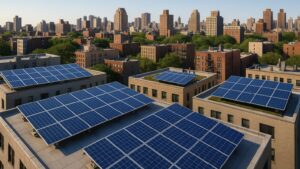While individuals in general and businesses, in particular, can and must take steps to reduce their carbon footprint, governments also have an important role to play in supporting and encouraging carbon reduction efforts. Governments have the ability to use policy (the carrot) and regulations (the stick) to pressure businesses to do the right thing and not cut corners.
Setting real Net-Zero Targets
Many governments or larger organizations, i.e. the European Union have already set ambitious targets for severely cutting carbon emissions. For example, the decision to attempt achieving net-zero emissions by 2050 or earlier, with intermediate targets to force businesses to begin adapting to the new reality. These targets should be legally binding and not voluntary, but ultimately they must be ambitious enough to drive significant action.
Providing Financial Incentives (the carrot)
Policies providing tax credits, subsidies, and grants for individuals and businesses that invest in renewable energy, energy-efficient technologies, and other carbon reduction strategies are good ways to make these aforementioned ideas seem like good investments. Governments can also establish and regulate carbon markets, which allow businesses to trade carbon credits, allowing more CO2-intensive companies to still “buy” their way out of emissions debt.
Investing in Renewable Energy
Governments should be funding research and development of new renewable energy technologies, as well as investing in the infrastructure necessary to support renewable energy production, such as transmission lines and energy storage systems, and batteries. This will require a twofold approach, with investments in R&D and infrastructure improvements. These will create new jobs, many of which will last in the long term, helping offset the initial costs of investment.
Implementing Regulations (the stick)
While financial incentives and investments in renewable energy can encourage carbon reduction, regulations should ensure that carbon reduction efforts are enforced until goals are reached. It’s also important to maintain no backpedaling so businesses do not renege on their commitments. Governments can implement regulations that require businesses and individuals to limit their carbon footprint, such as sustainable building codes that require energy-efficient construction and regulations banning fossil-fuel-burning vehicles. Governments need to work out effective punishments to dissuade companies from “eating” a fine.
Enforcing Sustainable Land Use
Land use significantly contributes to carbon emissions, particularly through rampant deforestation and the conversion of natural areas for agricultural or industrial use. Governments can promote exclusively sustainable land use practices, such as afforestation and reforestation, by providing incentives for farmers and landowners to adopt sustainable practices and by establishing protected areas that preserve biodiversity and better carbon sequestration.
Final thoughts
Governments have a critical role to play in supporting and encouraging carbon reduction efforts through net-zero policies, but it’s up to businesses to follow through. By setting ambitious targets, providing financial incentives, investing in renewable energy, implementing regulations, encouraging sustainable land use, and promoting behavior change, governments can force and maintain the transition to a low-carbon economy. Businesses should remember that net-zero is the goal of the future, one way or another, and would do best to start adapting now.
The Global Summit on Scope 3 Emissions Reduction will bring together key industry experts to learn more about reporting strategies & carbon data management in a small-scale, industry-driven event, on 20-21st April 2023 in Amsterdam, the Netherlands. The two-day, hybrid event features in-depth case studies of supply chain transformation, carbon accounting, and networking breaks dedicated to exchanging insights and expertise on tackling Scope 3 emissions. Visit future-bridge.eu and netzero-events.com or follow us on our social media to track other energy use and decarbonization events.





